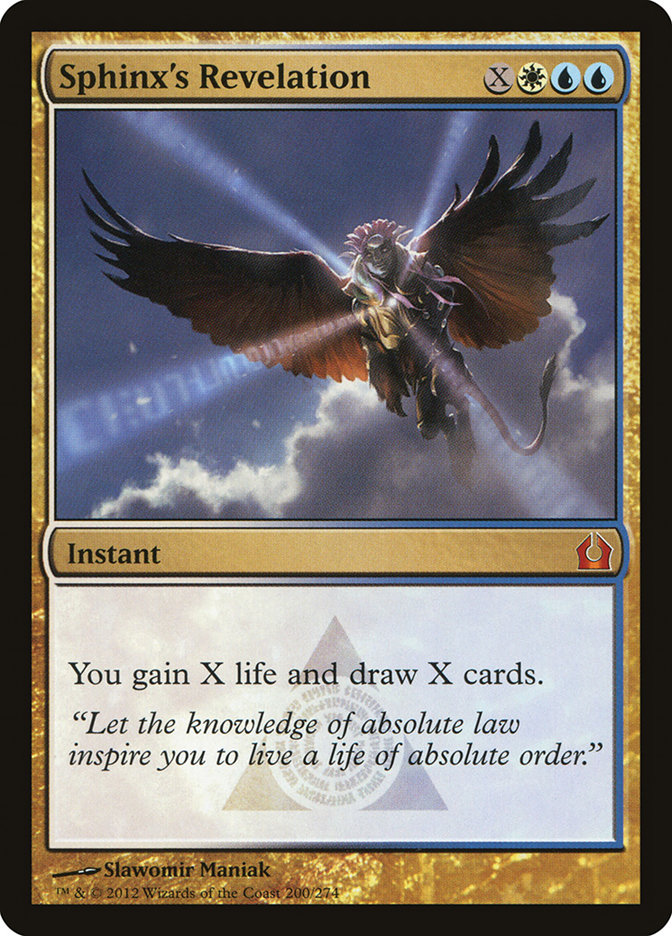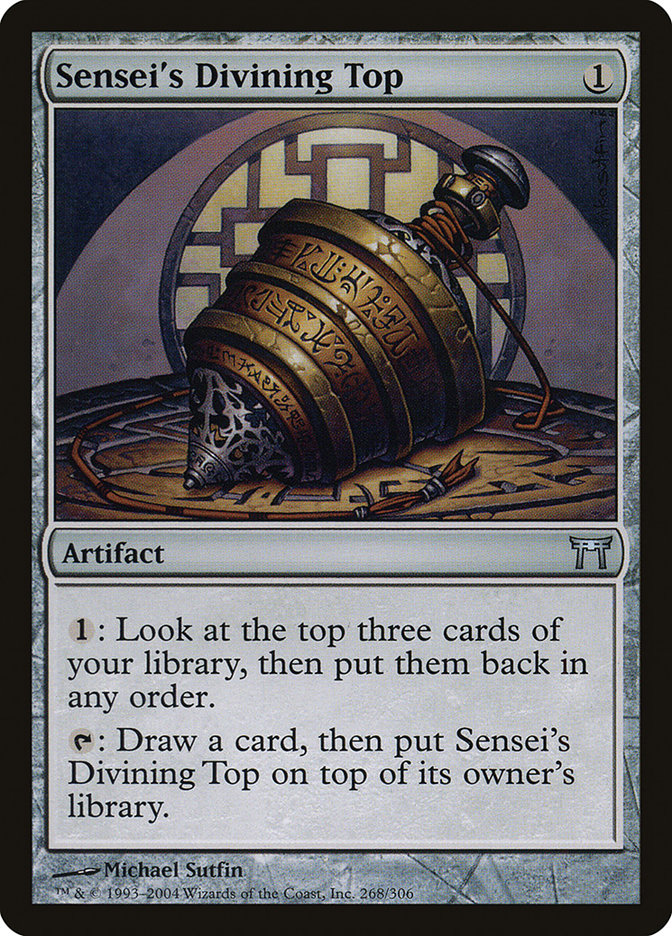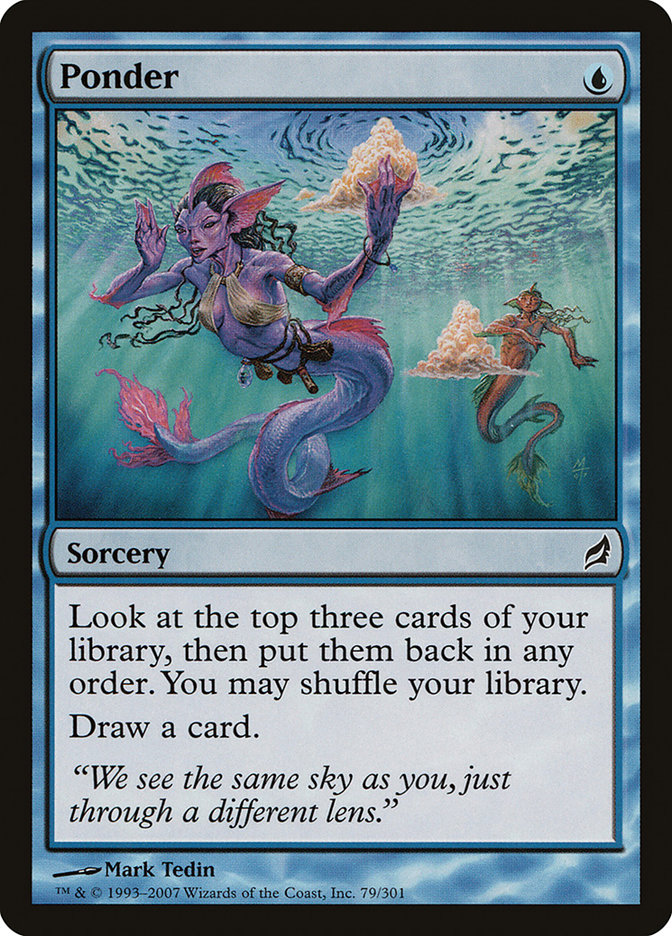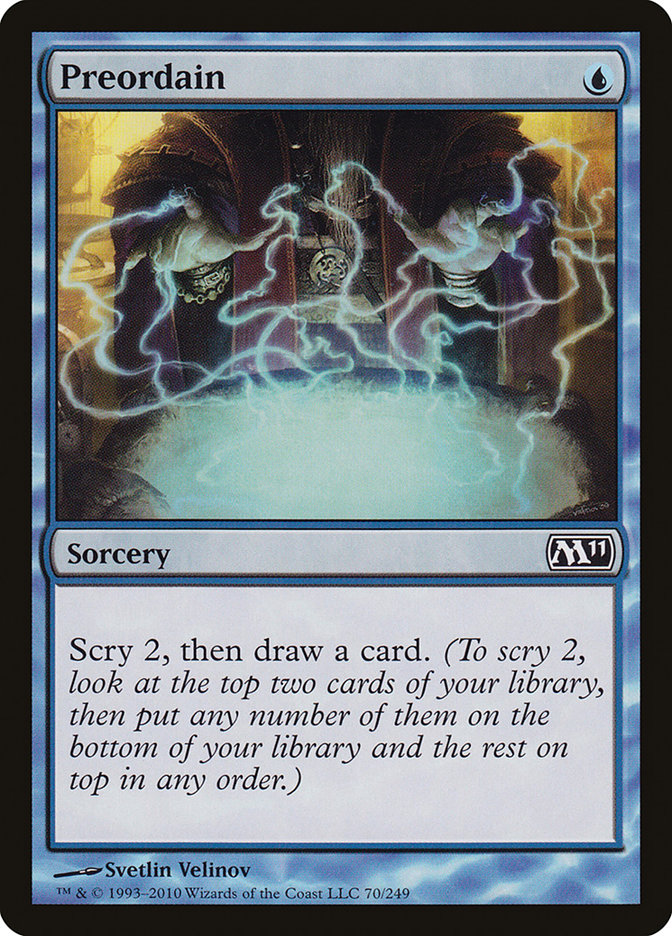I. An Introduction To The Woes Of Variance
It’s game 3 of your win-and-in match for the Top 8 of a PTQ.
You’re lucky enough to open up a very spicy hand on the draw. It’s a two-lander with a great curve.
Your first draw step serves up a useless Sphinx’s Revelation, so you play a Temple of Silence and scry a redundant Supreme Verdict to the bottom. It’s okay. All you need is a third land to turn your hand on by casting Divination or Detention Sphere if necessary.
Your opponent casts Pack Rat on his turn and passes back to you.
On your turn you still have no third land to speak of and pass the turn with an Azorius Charm to cycle. He makes a Pack Rat token and attacks. You cycle the Charm and draw for the turn, looking to draw a land to cast the Sphere, but no luck. You cycle another Azorius Charm, still don’t hit your third land drop, and discard at the end of your turn.
Your opponent plays a Mutavault, makes another Rat, and attacks you down to ten.
One last chance to get that Detention Sphere down and be right back in the game. To add insult to injury, you draw another Detention Sphere, and the game and your tournament are over.
"Ugh. What a newb," you think to yourself. "If I had just drawn a land to cast my Sphere I would have three-for-oned him and been right back in this game. I can’t believe I lost to this person just mindlessly playing a Pack Rat."
Sphinx’s Riddle #1: When would you happily trade a Sphinx’s Revelation for a Theros Island?
It feels absolutely horrible when it happens, but the fact of the matter is that games like this are not uncommon, which is why when I write about such a scenario I know that every single person who reads it can immediately identify and understand a mana screw bad beat story and relate to how frustrating it is.
One thing people don’t usually consider after a mana screw, mana flood, topdeck, or brick-brick-brick loss is that every player in the room has been on the bad side of the same bad beats during the tournament as well.
In the moment of losing to variance, it seems like a great personal injustice has been unfairly wrought upon us because the circumstances are beyond our control.
Players like to think about luck and variance as a part of the game that is mitigated and influenced by their skill, preparation, and decisions. Such a statement and sentiment is true, but only to a point.
Most people don’t really conceptualize how much energy goes into trying to minimize our vulnerability to the whims of variance in games of Magic, particularly with regard to drawing too few, too many, or incorrect combinations of land cards.
Sphinx’s Riddle #2: Why are these cards banned in Modern?
When you hear the words library manipulation, you’re hearing Magic code for cards that reduce variance. Cards that reduce variance for a low mana investment that can be used in the early turns reduce the variance of not making land drops tend to be among the best cards in any format where they are legal for Constructed play.
The best and most useful cards in Constructed Magic are the ones that reduce a player’s risk of losing games early and often to variance.
Good and bad luck is a bigger part of Magic than most players allow themselves to admit. Of course skill matters, but remember that if skill were the only thing that mattered, Luis Scott-Vargas, Jon Finkel, and Kai Budde would win everything.
Let’s return to the example from the beginning of the article and talk a little bit about etiquette and sportsmanship in tournament Magic.
Obviously, I can’t fault anybody for feeling frustrated or upset when they lose an important game to variance-related circumstances.
I’m a very fierce competitor, and I hate to lose. I hate to lose, and I want to win. I want to win every game and every match every time I play. Losing games to variance that is beyond my control is something that frustrates me.
One of the things I find most upsetting about losing to mana screw is that the opponent gets to move on in the tournament but it doesn’t feel like they deserved to beat you. They didn’t have to earn it, and that really stings.
In the example at the beginning of the article, our fictional opponent mindlessly made Pack Rat tokens, and we might have blown them out with our Detention Sphere. It is easy to look at it from the perspective of "if I drew a land, I could have gotten back into the game." However, making the Rat there is the correct play.
We are less than 50% to draw an untapped land on our last turn, and that mindless play is therefore better than 50% to win the game on the spot. Also, maybe he has a Gray Merchant of Asphodel in his hand, so the extra two points of damage might really matter more than the worst card in his hand. The damage may matter more simply because we are so mana screwed. One can afford to play differently knowing that there is an extreme constraint placed upon their opponent’s resources.
If the opponent can continue to play threats while our mana is constrained, it’s possible that the Mutavault will be able to deal four, six, or eight damage over the next few turns, making the Gray Merchant lethal if we ever tap out.
What I’m trying to articulate here is that often when we lose to something out of our control we perceive it as unlucky and take it out on our opponent.
II. What You Lose When You Lose It When You Lose
Here is the old adage I have been building to:
"I got mana screwed. My opponent played terribly, but I couldn’t do anything about it. So they won the game, said ‘good game,’ and reached out to shake my hand. Well, it wasn’t a good game. In fact, it was an awful game, and it is infuriating that my opponent said ‘good game.’"
I can’t lie. There have been many times throughout my experience playing Magic where I have had terrible sportsmanship. I think that’s all the more reason to be writing this article about the subject, as I can empathize greatly with having these types of feelings and behaviors.
I used to think it was quite cleaver to respond to being "good gamed" when I lost by saying things like "I don’t see what was so ‘good’ about it. I was mana screwed and didn’t cast a spell, but I’m glad you feel the need to take this opportunity to compliment yourself on your terrible play." Then I declined the handshake, disgustedly signed the match slip, and stormed away.
Let’s discuss this type of poor sportsmanship in a practical manner.
What does this behavior accomplish?
The intent behind this behavior is to make one’s opponent feel bad about themself. Maybe it succeeds in this endeavor, and maybe it doesn’t.
I can say from being on the dealing and receiving end of this treatment that if the intent is to make somebody feel bad that it is fairly ineffectual.
I know that when I have just won a match and my opponent makes some remark to me after the match because they are frustrated that mostly I don’t care. I’m already happy because I won. What does it matter to me that somebody is in a huff about losing and acting like a poor sport?
It’s the bad sportsmanship equivalent of saying "I want it on the record that I believe I am better than you and that you didn’t deserve to win."
Does saying so change the result of the match? No.
So what does saying it at all accomplish?
Well, it accomplishes a few things. First of all, it lets everybody who sees or hears you behaving this way know that you have an extreme lack of restraint, class, and sportsmanship.
Secondly, it basically shortsightedly burns any bridge between you and that player moving forward. For instance, maybe someday at some tournament in the future that player or one of their friends has the opportunity to scoop or draw you into the Top 8 or try to dream crush you out. If you were disrespectful to this person in the past, what are the chances that they take the opportunity to get a little payback?
When it is all said and done, here is what is actually accomplished by this behavior.
By acting in such a way as to imply (or overtly say) "I’m better than you and you didn’t deserve to win" at the end of a match, the only thing that can be gained is that a player might be able to make another human being feel bad, and the downside is that the player damages the way in which any person who views the interaction thinks upon them.
The behavior is all downside.
One of the most significant moments in my growth as a player came at a Grand Prix, and interestingly enough it came from a match that I wasn’t even a part of.
I was watching Brian Kibler get absolutely crushed in his Top 8 match and was really struck by how he was behaving. He was mulliganing, missing land drops, and facing down exceptional draws from his opponent, and his disposition didn’t seem even remotely phased by the experience.
While his draws couldn’t have been more dismal, his attitude and the way he was acting despite his poor luck couldn’t have been more cheery or positive. He didn’t give up and tried his best to make his severely outclassed cards play, but ultimately he lost the match in two quick games. Afterward he congratulated his opponent on a good match and wished him good luck.
The whole scenario was an eye opener for me as a frustrated tournament player.
Kibler didn’t need to complain about his bad draws. There was no point in acting annoyed that his draws had been miserable or in some way insinuating that he felt his opponent hadn’t deserved to win.
It’s impossible to be good at competing without being a very competitive person. Knowing how frustrated I often feel when confronted with losing (especially under conditions where variance has played a large role), I suddenly understood how significant it was that a player like Brian Kibler could be such a good sport about losing.
The experience motivated me to work on changing my own behavior and focusing on the way that I interacted with opponents, especially following a loss. Another thing that I noticed and still continue to notice to this day is that most players that I accept to be much better tournament players than me all operate with a high degree of good sportsmanship.
It’s a fact that good players tend to possess a high degree of good sportsmanship. To have good sportsmanship, especially after a frustrating loss, requires a person to be mentally strong and in control of their actions and emotions. These are qualities that all players recognize are important during games and matches, and they’re important after the game is over as well.
III. Dealing With Tilt & Other Bad Habits
When a player loses a match of Magic, they ought to congratulate their opponent, shake their hand, and wish them good luck in the next round.
What does this accomplish?
First of all, it demonstrates that you possess good sportsmanship and makes a good impression on your opponent and everybody watching your match.
It’s literally all upside.
Another benefit of making a habit of congratulating your opponent after a match is that it doesn’t give the opponent the opportunity to "good game" you first in games that were not in fact very good games. It simply saves you more frustration in a situation that might already be frustrating.
It doesn’t cost you anything to demonstrate that you know how to be a good sport, and it’s actually beneficial to you in the long run. As I said, all upside.
I am not perfect, but I aspire to be better. Most of the time following a loss, I congratulate my opponent and wish them good luck in the rest of the tournament.
It isn’t always easy for some people (myself included) to exhibit good sportsmanship after a particularly frustrating loss, but working on it and aspiring to do right is something that I believe is important for every tournament player to work on.
Believe me, the last thing that I want to do after losing a match when I’m in a foul mood is tell my opponent that it was a good match and that I hope they have good luck in the rest of the tournament. It can be exponentially more difficult when one feels that their opponent didn’t play their cards particularly well and wouldn’t have won without the aid of very good or very bad luck one way or another.
When I think about it objectively, I know that the high EV play is to always be a good sport, but in the moment it isn’t always so easy.
As I said before, I haven’t always cared about sportsmanship or making a good impression on people. Since I started working on it years ago after watching Kibler lose with grace, I have noticed that my efforts to be a better sportsman have paid off handsomely in ways that I hadn’t expected.
The biggest upside to losing in a sportsmanlike fashion is that it allows you to make new friends. When you’re telling a person something like "you really thought that was a good game?" making new friends isn’t the most pressing issue on your mind.
The ability to be a gracious loser leaves a very strong impression on other players because it demonstrates that a player has character. A player who throws a hissy fit when they lose is not the kind of person that people want to get to know or interact with.
People are more likely to stop and chat with you in between rounds when you have a reputation for being a person of character as opposed to being thought of as an individual that acts like a jerk.
I immediately began to notice that I had more people to talk to in between rounds when I was making a stronger effort to exhibit better sportsmanship in tournament Magic.
There’s a long dialogue among players online about how to respond when somebody beats you and then says "good game." The easiest answer is that if the losing player just says "good game" then it never even becomes an issue.
Nobody is perfect, and everybody makes mistakes. But with that being said, it’s important to note that everybody can try to be better than they are.
Losing always sucks, and since we can’t always win, it’s good to have a contingency plan for how we will act and what we will do when things don’t go our way.
The quality of our collective experiences playing the game depends upon everybody trying to do their part.





